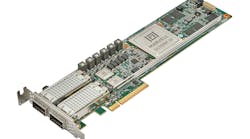Marvell Says Supply Takes Priority for Customers Amid Chip Price Hikes
Marvell CEO Matt Murphy said that customers have been willing to bear the brunt of higher prices for chips as long as they can get enough supply amid a global semiconductor deficit.
"The key focus we have now is planning our business together, making sure that we can not only meet short-term but also engage in multiple long-term agreements, where we have much stronger visibility into long-term supply," he said on a conference call to discuss quarterly earnings Thursday. "That has been the priority for us. That has been the priority for our customers. And I think the pricing has been second at this point."
Marvell, which primarily sells networking and data storage chips into data centers, telecom equipment, and cars, has managed to secure more capacity at outside foundries where it has chips mass-produced. However, demand for many of its chips is still exceeding its ability to supply them. In addition, the global chip shortage has sent price increases rippling through the supply chain, the Santa Clara, California-based company said.
The semiconductor industry is facing higher costs for everything from silicon wafers that are the raw material for chips to packaging substrates that chips are bonded to so they can tolerate being pinned to a circuit board. The costs of packaging, assembling, and testing final chips are also up. Major semiconductor firms are trying to bring more of these capabilities in-house to prevent bottlenecks as the industry's wafer supply improves.
As a result, some of the world's largest chip makers are raising the prices they charge their customers as they struggle to get ahead of demand, which is outstripping supply in many different sectors. The shortage, caused by wide swings in demand due to the coronavirus over the last year, has ravaged the global supply chain for car chips more than other areas, forcing many automakers to curb production due to chip procurement challenges.
Industry executives insist that they are not trying to take advantage of the supply crunch to wring larger profits from their customers. They have said raising prices reflects what they have been forced to pay foundries and other vendors in the supply chain to cover the rising cost of silicon wafers, substrates, and even resin used in packaging as the virus continues to spread.
"We've been able to work with them to pass that on," Murphy said. "We've done that pretty fairly and in a neutral manner and I anticipate, as we head into the 2022 calendar year, that there will be additional increases across the industry and input costs. And I'm confident, as part of Marvell, we'll be able to work with our customers to, again, neutralize that impact.”
Marvell is in the throes of a semiconductor shortage that has dragged on for close to a year at this point. The shortage has erased billions of dollars from the automobile industry's sales, and it has started to spread to an increasing number of sectors, forcing consumer electronics giants and other firms to fight for scarce supplies. The supply crunch has been compounded by a supply chain that has been strained by a prolonged drought in Asia and other natural disasters and that remains vulnerable to fallout from new strains of the deadly virus.
Many industry executives have warned the chip supply crunch could last into 2022 and possibly 2023.
Some of the world's largest semiconductor firms are completely (or for the most part) fabless. But many of the foundries they depend on have been overloaded with orders and some have reportedly lifted prices as a result.
The Wall Street Journal recently reported that TSMC is raising prices for its most advanced chips by up to 10% and more mature nodes by up to 20% in response to the ongoing surge in demand driving the parts shortage.
Last year, Marvell entered the upper echelons of TSMC's customer base, partnering with the world's largest foundry to upgrade its lineup of server networking chips to 5-nm, the world's most advanced process node.
While far from being resolved, the global chip shortage has been a boon to the company's finances. Marvell said sales improved to $1.076 billion in the second quarter of 2021, growing by 48% from a year ago and by 29% a quarter ago, a record for the company in a single quarter. Driving the growth were sales of data center chips to the likes of Amazon, Microsoft, and other cloud vendors, which now represent 40% of its total revenue.
Another booster shot came from the close of its $10 billion deal to buy silicon photonics and networking chip maker Inphi—part of its strategy to a wider range of server chips to customers. Marvell said that its data center business performed best over the last quarter with revenue of $434 million, up 40% from a year ago. It is also expanding its footprint in the telecom market, where its sales came to $197 million, up 18% over the last year.
In the current quarter, Marvell foresees sales of around $1.145 billion with earnings of 38 cents per share. “We expect year-over-year revenue growth will accelerate in the third quarter, led by substantial contributions from the cloud data center market,” Murphy said. “In addition, we expect our 5G business to continue to grow with strong sequential revenue growth in the third quarter and a significant step-up projected in the fourth quarter."
Marvell said net income, excluding some costs, was $284 million, or 34 cents per share in the second quarter.

